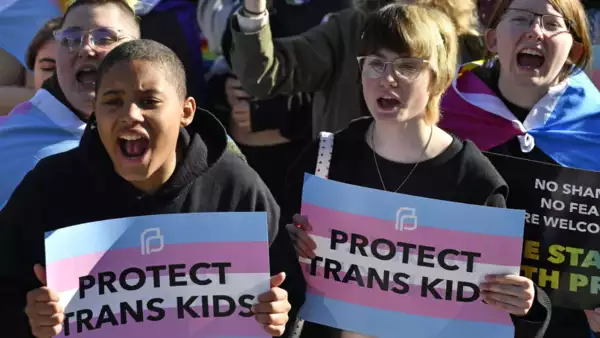The US Supreme Court is at the centre of a groundbreaking legal battle over transgender rights, specifically focusing on medical care for transgender minors. This case, US v. Skrmetti, challenges a 2023 Tennessee law banning gender-affirming medical treatments for individuals under 18, including puberty blockers and hormone therapies. The case, set against the backdrop of heated national debates on LGBTQ+ rights, holds the potential to reshape anti-discrimination laws and redefine the scope of transgender rights in the United States.
This pivotal case brings together multiple layers of legal, medical, and political arguments, making it one of the most consequential cases in recent history for LGBTQ+ rights and civil liberties.
What Is the Case About?
At its heart, the case revolves around Tennessee’s Senate Bill 1 (SB 1), which prohibits minors from accessing gender-affirming medical care. The law imposes civil penalties on medical providers who violate these restrictions. While surgeries are not central to this case, the focus lies on the bans on puberty blockers and hormone treatments aimed at aligning a minor’s physical development with their gender identity.
The law explicitly prohibits treatments designed to help minors identify with a gender different from their assigned sex at birth. However, it allows similar treatments for cisgender minors dealing with congenital defects or other medical conditions. Tennessee lawmakers argue that minors lack the capacity to fully comprehend the life-altering nature of these treatments, framing the law as a protective measure.
The Biden administration and advocacy groups argue that such laws discriminate based on sex and transgender status, violating the Equal Protection Clause of the 14th Amendment and established anti-discrimination precedents.
Key Issues the Supreme Court Will Address

One of the plaintiffs in the Supreme Court case on a ban on gender-affirming care for transgender minors, Dr. Susan Lacy, poses for a portrait at her clinic in Memphis, Tennessee, U.S., November 21, 2024. REUTERS/Karen Pulfer Focht
1. Discrimination Based on Transgender Status
This case asks whether laws targeting transgender individuals, specifically minors, constitute unconstitutional discrimination. Advocates argue that denying gender-affirming care to transgender youth constitutes sex-based discrimination, citing the 2020 Bostock v. Clayton County decision. In that case, the court ruled that discrimination against transgender individuals in the workplace inherently involves sex discrimination.
The Biden administration has argued that transgender individuals should be recognized as a “quasi-suspect class,” a designation that would subject laws like Tennessee’s to heightened judicial scrutiny. Under this standard, states would need to demonstrate that their laws serve an important governmental interest and are narrowly tailored to achieve that goal.
2. Parental Rights vs. State Authority
The challengers argue that the law infringes on parental rights by preventing families from making medical decisions in consultation with healthcare providers. Parents of transgender minors assert that access to gender-affirming care is critical for their children’s mental and emotional well-being.
Tennessee, on the other hand, claims that the state has a compelling interest in regulating medical care for minors and protecting them from potentially irreversible decisions during adolescence.
3. Medical Evidence and Standards of Care
A critical component of the case is the disagreement over medical consensus. Major medical organizations, including the American Medical Association (AMA) and the American Academy of Pediatrics (AAP), support gender-affirming care, citing research indicating that such treatments improve mental health outcomes and reduce the risk of suicide among transgender youth.
However, Tennessee and its supporters argue that these treatments are “risky” and lack long-term evidence, particularly for minors. The state frames its law as a precautionary measure against experimental interventions.
4. National Implications
A ruling in favour of the Biden administration could strike down similar laws in other states, reshaping access to gender-affirming care nationwide. Conversely, if the court upholds Tennessee’s law, it could embolden states to pass additional restrictions targeting transgender individuals, potentially extending beyond healthcare to areas like education, sports, and public accommodations.
Key Arguments from Both Sides

Indiana transgender youth treatment ban upheld by federal court (Picture credit: X)
Biden Administration and Transgender Advocates
Equal Protection: The law discriminates based on transgender status, violating the 14th Amendment. The administration argues that denying gender-affirming care inherently involves sex discrimination.
Medical Necessity: Gender-affirming care is widely endorsed by medical experts as safe and essential for the well-being of transgender youth. Denying this care increases risks of depression and suicide.
Parental Autonomy: Families should have the right to make medical decisions for their children without government interference.
Quasi-Suspect Class: Transgender individuals meet the criteria for heightened legal protections due to their history of discrimination and vulnerability.
Tennessee and Supporters of the Law
State Interest: The state has a legitimate interest in protecting minors from potentially harmful and irreversible medical interventions.
No Discrimination: Tennessee argues that the law does not discriminate based on sex but instead creates age-based restrictions.
Unproven Treatments: The state frames gender-affirming care for minors as experimental and lacking sufficient evidence to justify its use.
Protecting Women’s Rights: Supporters of the law claim that recognizing transgender individuals under anti-discrimination protections could erode women’s rights in areas like sports and public facilities.
Historical and Legal Context
This is only the second major Supreme Court case dealing with transgender rights. The 2020 Bostock v. Clayton County decision established that federal law protects transgender workers from employment discrimination. However, the ruling was limited to workplace protections and did not address broader issues such as healthcare or education.
Since then, conservative-majority courts and legislatures have enacted numerous laws restricting transgender rights, creating a patchwork of protections and prohibitions across the United States.
Broader Implications of the Case
For Transgender Youth
If the Supreme Court rules against the Biden administration, transgender minors could face even greater obstacles in accessing gender-affirming care. Many families have already resorted to travelling across state lines to obtain necessary treatments, a burden that disproportionately impacts low-income families.
For Anti-Discrimination Laws
The case has the potential to redefine the scope of anti-discrimination protections under federal law. A ruling that affirms Tennessee’s law could weaken protections for other marginalized groups, including cisgender women and LGBTQ+ individuals.
For State vs. Federal Power
The case underscores the tension between state autonomy and federal oversight in civil rights matters. A ruling upholding Tennessee’s law could embolden states to pass further restrictive legislation targeting vulnerable populations.
Key Figures and Moments to Watch
Chief Justice John Roberts and Justice Neil Gorsuch: Both played pivotal roles in the Bostock decision. Their votes will be closely watched as the court navigates the balance between conservative ideology and legal precedent.
Solicitor General Elizabeth Prelogar: Representing the Biden administration, Prelogar’s arguments will focus on the broader implications of denying protections to transgender individuals.
Chase Strangio: As the first openly transgender lawyer to argue before the Supreme Court, Strangio’s participation marks a historic moment in the fight for LGBTQ+ rights.
